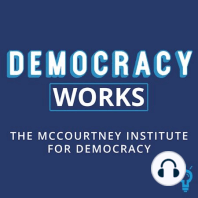32 min listen
When states sue the federal government
FromDemocracy Works
ratings:
Length:
30 minutes
Released:
Oct 15, 2018
Format:
Podcast episode
Description
It seems like every few weeks, we see headlines about states banding together to block actions taken by the federal government. You might even remember former Texas Attorney General Greg Abbott quipping that he goes to the office, sues the federal government, then goes home.
How do those lawsuits take shape? How does a state decide whether to join or not? How does that impact the balance of power between federal and state governments? This week’s guest is uniquely qualified to answer all of those questions.
Since taking office in January 2017, Pennsylvania Attorney General Josh Shapiro has been involved with more than a dozen suits brought against the federal government on matters ranging from family separation at the border to EPA emissions regulations. Though Shapiro is a Democrat, he says his chief motivation in joining these suits is the rule of law and a commitment to do what’s right for people of Pennsylvania.
Whether or not you agree with Shapiro’s politics, he does present an interesting take on the role that states play as a check on the federal government. This power is a unique part of the American experiment and speaks to the power of democracy in the states.
Before the interview, Chris and Michael dive into the origins of federalism, including Federalist 51, the 10th Amendment, and the Emoluments Clause of the Constitution.
Additional Information
Pennsylvania Office of the Attorney General
Federalist 51
Discussion/Reflection Questions
What do you think should be the balance between the states and federal government in terms of power?
Do you think states should be active in legal action against the federal government?
Do you think that state attorneys general are becoming too political?
Do you see state as a shield to protect a state’s residents against federal overreach?
Interview Highlights
[5:12] When you took this office, did you expect yourself to be this active on federal issues?
Shapiro: I said when I was sworn in that if someone was going to try to mess with Pennsylvania that they would have to go through me. I see the constitution as giving the states broad authority. States rights isn’t something progressives have pointed to, but it is something I value. If someone in the federal system is doing something to undermine our rights, I’m going to stand up to take action.
[6:32] How do one of these suits against the federal government get started?
Shapiro: The first question is whether the action comports with the rule of law. I put aside what I agree or disagree with personally and instead focus on the law. Once we deem that an illegal action has been taken, be think about what is the best way to file an action to challenge that activity. We discuss whether or not Pennsylvania should be the lead state. There are sometimes strategic reasons why we file a suit in a particular state. What we are not doing is constructing opposition to the president just for the sake of opposing him. What we are doing is organizing ourselves around the rule of law.
[8:43] What issues or possible suits have you turned down?
Shapiro: We’ve been involved in about fifteen cases since taking office. I’m very careful about what we engage in on behalf of the people of Pennsylvania. Again, it is not my job just to weigh in whenever I personally disagree with the president. It is my job to weigh in when the rule of law is being threatened.
[9:31] What is the timeline for one of these cases?
Shapiro: I spend the majority of my time going around to differnt places listening to people. I think I have a good feel for where the people of the state are. I don’t poll test these issues. Instead, I try to do what is right and what adheres to the rule of law.
[10:36] Under Obama, we saw a lot of states file suits against the federal government much like what is happening now with Trump in office. Do you think this goes to the partisan nature of government?
Shapiro: I would actually push back on that a little. Most of what I do is bipartisan. It’
Released:
Oct 15, 2018
Format:
Podcast episode
Titles in the series (100)
How Democracies Die author Daniel Ziblatt on the ‘grinding work’ of democracy: Daniel Ziblatt has done a lot of interviews since the release of How Democracies Die, the bestselling book he co-wrote with Steven Levitsky. But we asked him a question he’d never gotten before — about a line toward the end of the book when he refers to democracy as “grinding work.” by Democracy Works
